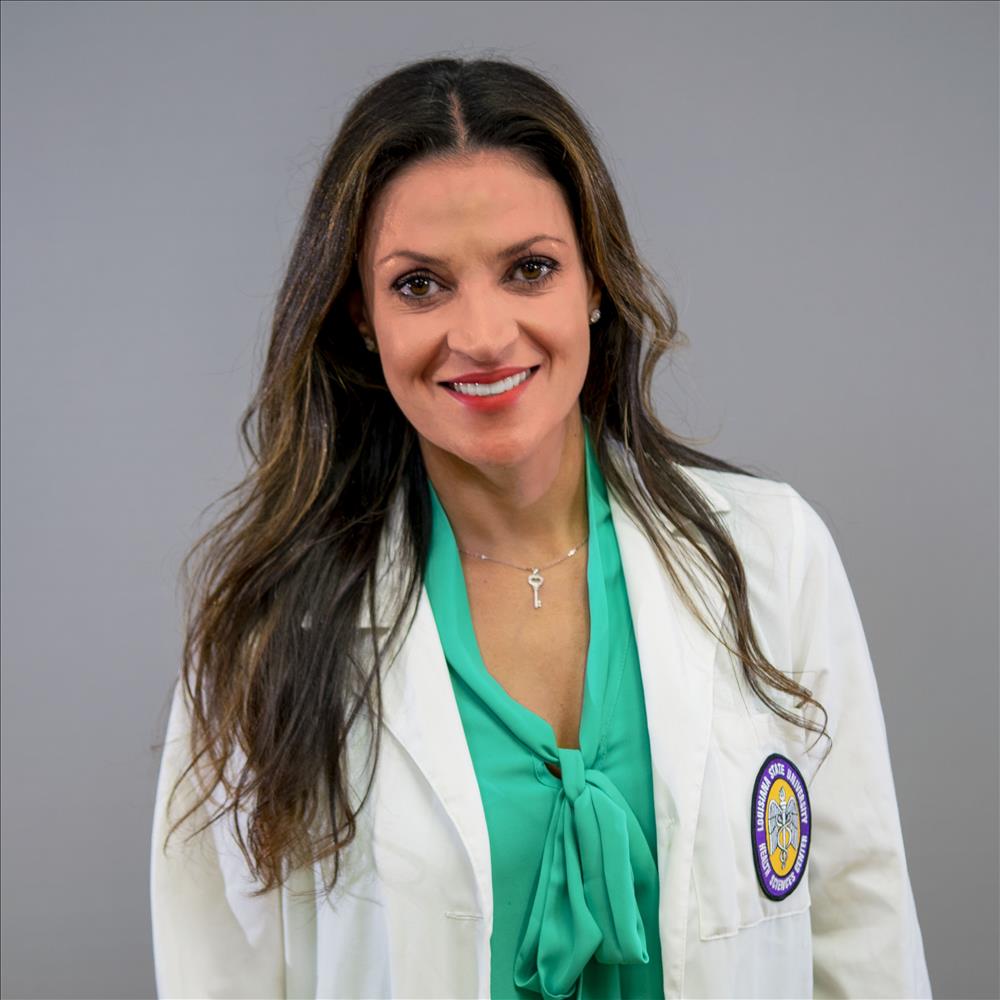
FACULTY
Flavia M. Souza-Smith, PhD
Assistant Professor of Research
Physiology
- fsouz1@lsuhsc.edu
- Medicine
Academic Office:
LSUHSC School of Medicine
533 Bolivar Street, Room 310
New Orleans, LA 70112
504-568-6179
Bio
Dr. Flavia M. Souza-Smith is an Assistant Professor of Research in Physiology at LSU Health Sciences Center in New Orleans. She earned her B.S. in Physical and Respiratory Therapy from EMESCAM in Brazil (2002), followed by an M.S. in Physiology from the Federal University of Espírito Santo (2004), and a Ph.D. in Physiology from the same institution, with additional training at the Pharmacology Department at LSUHSC (2009). Her research focuses on lymphatic physiology, immunometabolism, and alcohol-induced metabolic dysfunction, particularly the impact of alcohol on mesenteric lymphatic integrity and perilymphatic adipose tissue. She has published extensively, secured NIH funding, and presented her work globally. Dr. Souza-Smith is a committed educator and mentor, teaching on and directing multiple physiology courses across LSUHSC’s schools and guiding students from undergraduate to MD/PhD levels. She actively contributes to professional societies and community outreach and has received multiple awards and honors including the Chancellor’s Excellence Award and serves on multiple national committees.
Education
BS - 2002, Physical Therapy, Brazil
MS - 2004, Physiology, Brazil
PhD - 2009, Physiology Brazil; Pharmacology, LSUHSC - NO
Teaching
Dr. Flavia M. Souza-Smith has a strong commitment to physiology education. She has served as Director or Co-Director for numerous foundational courses, including Human Physiology, Human Pathophysiology, Physiology Seminar, and Professionalism courses for students in Nursing, Graduate Studies, Dentistry, and Allied Health Schools at LSUHSC. Her teaching spans over 500 hours of live instruction to large and moderate groups with an average of 575 learners per year. Her teaching includes gastrointestinal physiology and pathophysiology and cardiovascular and respiratory physiology. She has led curriculum development by redesigning graduate physiology courses into a streamlined allied health curriculum. In addition, she has also contributed to educational scholarship through workshops, presentations, and global outreach, including organizing physiology education programs in Cuba and Guatemala. Dr. Souza-Smith’s educational leadership is marked by innovation, interdisciplinary collaboration, and a dedication to student success across undergraduate, graduate, and professional programs.
Selected Publications
Katz PS, Trask AJ, Souza-Smith FM, Hutchinson KR, Galantowicz ML, Lord KC, Stewart JA Jr, Cismowski MJ, Varner KJ, Lucchesi PA. . Coronary arterioles in type 2 diabetic (db/db) mice undergo a distinct pattern of remodeling associated with decreased vessel stiffness. Basic Res Cardiol. 2011, Jul 10. PMID: 21744279. Impact Factor: 9.5
Souza-Smith FM, Katz PS, Trask AJ, Stewart JA, Lord KC, Varner KJ, Vassallo DV, Lucchesi PA. Mesenteric resistance arteries in type 2 diabetic mice undergo outward remodeling. PLoS One. 2011 Aug; 6(8):e23337. PMID: 21829729. Impact Factor: 2.9
Molina, PA, Gardner JD, Souza-Smith FM, Whitaker AM. Alcohol abuse; critical pathophysiological processes & contribution to disease burden. Physiology (Bethesda). 2014 May;29(3):203-15. PMID: 24789985. Impact Factor: 6.2
Souza-Smith FM, Siggins RW, Molina PE. Mesenteric lymphatic-perilymphatic adipose crosstalk; role in alcohol-induced perilymphatic adipose tissue inflammation. Alcohol Clin Exp Res. 2015 Aug;39(8):1380-7 PMID: 26147204. Impact Factor: 3.9
Souza-Smith FM, Ford SM, Simon L, Molina PE. Repeated Binge-Like Alcohol Intoxication: Depot Specific Adipose Tissue Immuno-Metabolic Dysregulation. Shock. 2017 Aug;48(2):243-250. PMID: 28125531. Impact Factor: 2.7
Poret J, Souza-Smith F, Marcell S, Gaudet D, Tzeng T, Braymer H, Harrison-Bernard L, Primeaux S. High fat diet consumption differentially affects adipose tissue inflammation and adipocyte size in obesity-prone and obesity-resistant rats. Int J Obes (Lond), Mar 2018. PMID: 29151595. Impact Factor: 5.0
Souza-Smith FM, Simon L, Siggins R, Molina P. Alcohol-Induced Mesenteric Lymphatic Permeability; Link to Immunometabolic Modulation of Perilymphatic Adipose Tissue. Int. J. Mol. Sci., Aug 2019, 20(17) 4097. PMID: 31443389. Impact Factor: 6.2
Herrera M, Molina P, Souza-Smith FM. Ethanol-induced lymphatic endothelial cell permeability via MAP-kinase regulation. Am J Physiol Cell Physiol. 2021 July 1;321(1):C104-C116. PMID: 33909502. Impact Factor: 5.0
Simon L, Souza-Smith FM, Molina PE. Alcohol-Associated Tissue Injury: Current Views on Pathophysiological Mechanisms. Annu Rev Physiol., 2022, 10;84:87-112. PMID: 35143331. Impact Factor: 19.1
Siggins R, McTerman P, Simon L, Souza-Smith FM, Molina PE. Mitochondrial Dysfunction: At the Nexus between Alcohol-Associated Immunometabolic Dysregulation and Tissue Injury. International Journal of Molecular Sciences, May 2023, 12;24(10):8650. PMID:37239997. Impact Factor: 6.2
Weaver KD, Simon L, Molina PE, Souza-Smith FM. The Role of Lymph-Adipose Crosstalk in Alcohol-Induced Perilymphatic Adipose Tissue Dysfunction. Int J Mol Sci, 2024 Oct 8;25(19):10811. PMID: 39409139. Impact Factor: 6.2
Research Interests
In the past years my scientific work bridged the gastrointestinal and immune systems with metabolism research to uncover how alcohol disrupts mesenteric lymphatic function, affecting immune cell trafficking from the gut, and contributing to systemic metabolic disorders. In recent years, my professional focus has transitioned from primarily research-driven activities to a deep commitment to academia and education. This shift reflects my passion for teaching the next generation of healthcare professionals and scientists. In addition to my teaching contributions across multiple schools in the past years, including Nursing, Graduate Studies, Dentistry, and Allied Health, I have taken on increasing leadership in curriculum development and course directorship. I have served as Director or Co-Director for several core courses in human physiology and pathophysiology, such as: 1) Human Physiology (HLSC2410) – School of Nursing; 2) Human Pathophysiology (HLSC3410) – Accelerated and Traditional Nursing Tracks; 3) Human Physiology (PHTH7120) – Physical Therapy Program; 4) Human Physiology (PHYSIO6523) – Physician Assistant Program; and 5) Physiology Seminar Series and Professionalism Courses – School of Graduate Studies. My teaching philosophy centers on clarity, clinical relevance, and student engagement. This evolving focus on education has allowed me to integrate my scientific expertise into dynamic, student-centered learning environments that prepare learners for both clinical and research careers.
